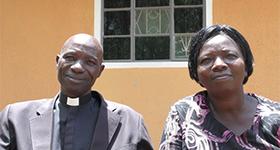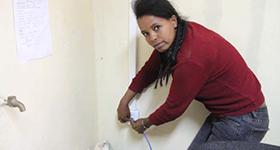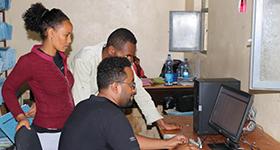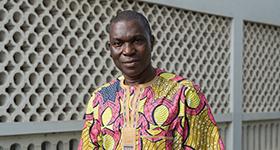Background
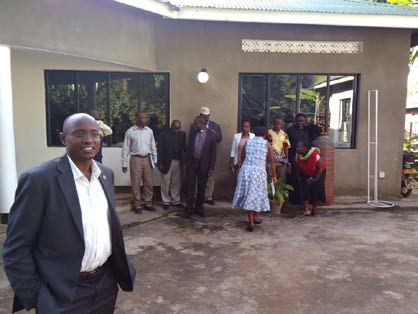
Dr. Tonny Tumwesigye, Executive Director of the Uganda Protestant Medical Bureau was one of the facilitators training religious leaders on family planning. Photo credit: Judith Kiconco
A woman in Uganda knew her husband did not approve of her use of contraception, so she told him her vaginal foaming tablets were for headaches. One day she discovered he had swallowed the tablets himself to cure his own headache. This was the story Reverend Yona Chris Kyewe, Executive Director of the Family Life Education Program in Uganda shared in a training session conducted by Christian Connections for International Health (CCIH), under the Advancing Partners & Communities project, and the Uganda Protestant Medical Bureau (UPMB). The training was designed to educate religious leaders about family planning (FP) and encourage communication in their congregations about this lifesaving health intervention.
Women in Uganda suffer a high maternal mortality rate of 343 deaths per 100,000 live births, one of the highest rates in the world. They also have a high fertility rate and give birth to an average of two children more than they desire, with many unintended pregnancies ending in abortion. FP is necessary to reduce unintended pregnancies, but the use of contraception in the country is low. In rural areas, it is used by about 23 percent of women.
Religious leaders are in a prime position to change harmful attitudes about FP. They are some of the most important and respected opinion leaders in Ugandan communities and can help shift social norms. By virtue of their status and position in society, religious leaders can play a critical role in the community to ensure uptake of FP services. But in order to educate and change minds, religious leaders must have correct information about reproductive health (RH) and FP, and they must be comfortable talking about these topics.
Intervention
To equip clergy to discuss and promote healthy timing and spacing of pregnancies (HTSP), CCIH and UPMB conducted a two-day training for a diverse group of religious leaders, including Catholic, Muslim, Pentecostal and Protestant leaders.
The objectives of the training were to prepare the leaders to use knowledge of RH to educate and counsel clients, and to apply selected concepts to FP/RH services; explain key HTSP messages and understand their links to FP; identify and clarify rumors about contraception; identify the FP methods available in the local context and where to receive them; support couples to improve communication; and conduct learning sessions for congregations on HTSP.
The facilitators for the workshop were Dr. Tonny Tumwesigye, Executive Director of UPMB; Judith Hope Kiconco, Reproductive Health Officer of UPMB; and Davis Wacha and James Mwesigwa of UPMB. The training was interactive with small and large group discussions, and opportunities for participants to work together as a group.
Outcomes
An assessment conducted at the end of the course revealed a significant increase in participant knowledge on FP after the training. The religious leaders in the training averaged 30.7 percent in pretest scores of their knowledge and 57 percent in post-test scores, an increase of about 85 percent. In one case, the score of a Catholic leader rose from 5 percent to 52 percent, showing vast improvement in his knowledge of FP. In addition, participants reported finding a simulation exercise conducted in the classroom very useful.
Some of the ideas religious leaders had for encouraging communication about HTSP included mainstreaming FP information in routine activities, including information in sermons, involving peer and adolescent groups, couples counseling, demystifying myths about FP, and using role models.
Lessons Learned
At the end of the training, Dr. Tumwesigye challenged the participants to start immediately demystifying preconceptions the public has about religious leaders and FP, and debunk the myth that religion is against FP. He stressed that, from the discussions, it was clear that no religion is against FP. Rather, different faiths are comfortable with different methods and should promote what is right for their congregations.
Religious leaders and faith communities need to be provided information about all FP methods, and should be aware that they should not force a community to use a method members are uncomfortable with.
Religious leaders are very open to discussing and learning about FP when they are in a comfortable environment with their peers. FP knowledge can be vastly improved through lectures combined with group work, discussions, and interactive role play.
Future trainings focused on religious leaders in their communities can reach even more leaders who can share these important messages with their congregations and help change attitudes toward FP.

